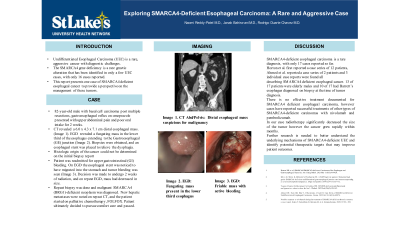Tuesday Poster Session
Category: Esophagus
P3336 - Exploring SMARCA4-Deficient Esophageal Carcinoma: A Rare and Aggressive Case Study
Tuesday, October 24, 2023
10:30 AM - 4:00 PM PT
Location: Exhibit Hall

Has Audio

Naomi Reddy-Patel, MD
St. Luke's University Hospital
Bethlehem, PA
Presenting Author(s)
Naomi Reddy-Patel, MD1, Janak Bahirwani, MD1, Zarian Prenatt, DO2, Het Patel, DO2, Rodrigo Duarte-Chavez, MD1
1St. Luke's University Hospital, Bethlehem, PA; 2St. Luke's University Health Network, Bethlehem, PA
Introduction: Undifferentiated esophageal carcinoma (UEC) is a rare, aggressive cancer with diagnostic challenges. The SMARCA4 gene deficiency is a rare genetic alteration that has been identified in only a few UEC cases. We present a case of SMARC4-deficient esophageal cancer to provide a perspective on the management of these tumors
Case Description/Methods: An 82-year-old male with basal cell carcinoma post multiple resections, gastroesophageal reflux on omeprazole and no other significant social or family history presented with upper abdominal pain, dysphagia, and poor oral intake for 2 weeks. Computed Tomography (CT) revealed a 6.0 x 4.3 x 7.1 cm distal esophageal mass. (Image A). Esophagogastroduodenoscopy (EGD) revealed a fungating mass in the lower third of the esophagus extending to the Gastroesophageal (GE) junction (Image B). Biopsies were obtained, and an esophageal stent was placed to relieve the dysphagia. The initial biopsy report was highly suspicious for plasma lymphoblastic lymphoma; however, pathology was sent out for 2nd opinion and histologic origin of the cancer could not be determined. Weeks after discharge the patient developed upper gastrointestinal (GI) bleeding. On EGD the esophageal stent was noticed to have migrated into the stomach and tumor bleeding was seen (Image C). A new stent was placed and initially the bleeding improved, however the patient continued to have further episodes of bleeding prompting the start of palliative radiation. After 2 weeks of radiation, the patient had a repeat EGD, and the mass had decreased in size. Repeat biopsy was done and malignant SMARC A4 (BRG1)-deficient neoplasm was diagnosed. New hepatic metastases were noted on repeat CT, and the patient started on palliative chemotherapy, FOLFOX
Discussion: SMARCA4-deficient esophageal carcinoma is a rare diagnosis, with only 16 cases reported so far. Of all the cases studied, none of the patients who underwent treatment were cancer-free at the time of publication. There is no effective treatment documented for SMARCA4 deficient esophageal carcinoma, however cases have reported successful treatments of other types of SMARCA4-deficient carcinomas with nivolumab and pembrolizumab. In our case radiotherapy significantly decreased the size of the tumor however the cancer grew rapidly within months. Further research is needed to better understand the underlying mechanisms of SMARCA4-deficient UEC and identify potential therapeutic targets that may improve patient outcomes

Disclosures:
Naomi Reddy-Patel, MD1, Janak Bahirwani, MD1, Zarian Prenatt, DO2, Het Patel, DO2, Rodrigo Duarte-Chavez, MD1. P3336 - Exploring SMARCA4-Deficient Esophageal Carcinoma: A Rare and Aggressive Case Study, ACG 2023 Annual Scientific Meeting Abstracts. Vancouver, BC, Canada: American College of Gastroenterology.
1St. Luke's University Hospital, Bethlehem, PA; 2St. Luke's University Health Network, Bethlehem, PA
Introduction: Undifferentiated esophageal carcinoma (UEC) is a rare, aggressive cancer with diagnostic challenges. The SMARCA4 gene deficiency is a rare genetic alteration that has been identified in only a few UEC cases. We present a case of SMARC4-deficient esophageal cancer to provide a perspective on the management of these tumors
Case Description/Methods: An 82-year-old male with basal cell carcinoma post multiple resections, gastroesophageal reflux on omeprazole and no other significant social or family history presented with upper abdominal pain, dysphagia, and poor oral intake for 2 weeks. Computed Tomography (CT) revealed a 6.0 x 4.3 x 7.1 cm distal esophageal mass. (Image A). Esophagogastroduodenoscopy (EGD) revealed a fungating mass in the lower third of the esophagus extending to the Gastroesophageal (GE) junction (Image B). Biopsies were obtained, and an esophageal stent was placed to relieve the dysphagia. The initial biopsy report was highly suspicious for plasma lymphoblastic lymphoma; however, pathology was sent out for 2nd opinion and histologic origin of the cancer could not be determined. Weeks after discharge the patient developed upper gastrointestinal (GI) bleeding. On EGD the esophageal stent was noticed to have migrated into the stomach and tumor bleeding was seen (Image C). A new stent was placed and initially the bleeding improved, however the patient continued to have further episodes of bleeding prompting the start of palliative radiation. After 2 weeks of radiation, the patient had a repeat EGD, and the mass had decreased in size. Repeat biopsy was done and malignant SMARC A4 (BRG1)-deficient neoplasm was diagnosed. New hepatic metastases were noted on repeat CT, and the patient started on palliative chemotherapy, FOLFOX
Discussion: SMARCA4-deficient esophageal carcinoma is a rare diagnosis, with only 16 cases reported so far. Of all the cases studied, none of the patients who underwent treatment were cancer-free at the time of publication. There is no effective treatment documented for SMARCA4 deficient esophageal carcinoma, however cases have reported successful treatments of other types of SMARCA4-deficient carcinomas with nivolumab and pembrolizumab. In our case radiotherapy significantly decreased the size of the tumor however the cancer grew rapidly within months. Further research is needed to better understand the underlying mechanisms of SMARCA4-deficient UEC and identify potential therapeutic targets that may improve patient outcomes

Figure: (A) CT Abd/Pelvis - Distal esophageal mass suspicious for malignancy.
(B) Esophagogastroduodenoscopy - Fungating mass present in the lower third esophagus.
(C) Esophagogastroduodenoscopy - Friable mass with active hemorrhage in the lower third esophagus.
(B) Esophagogastroduodenoscopy - Fungating mass present in the lower third esophagus.
(C) Esophagogastroduodenoscopy - Friable mass with active hemorrhage in the lower third esophagus.
Disclosures:
Naomi Reddy-Patel indicated no relevant financial relationships.
Janak Bahirwani indicated no relevant financial relationships.
Zarian Prenatt indicated no relevant financial relationships.
Het Patel indicated no relevant financial relationships.
Rodrigo Duarte-Chavez indicated no relevant financial relationships.
Naomi Reddy-Patel, MD1, Janak Bahirwani, MD1, Zarian Prenatt, DO2, Het Patel, DO2, Rodrigo Duarte-Chavez, MD1. P3336 - Exploring SMARCA4-Deficient Esophageal Carcinoma: A Rare and Aggressive Case Study, ACG 2023 Annual Scientific Meeting Abstracts. Vancouver, BC, Canada: American College of Gastroenterology.
